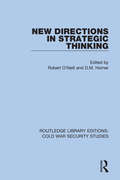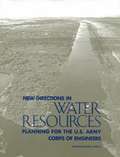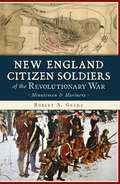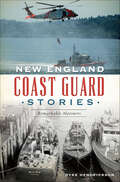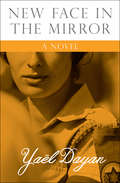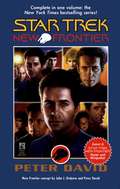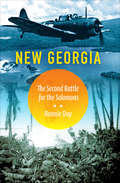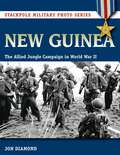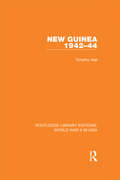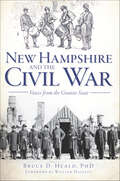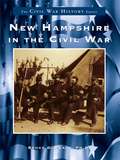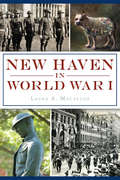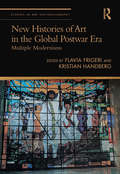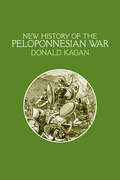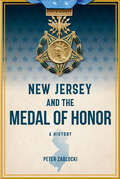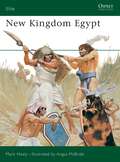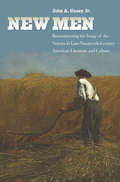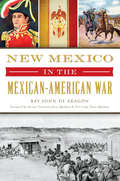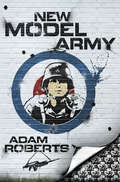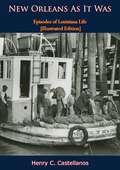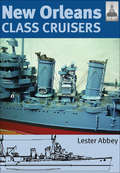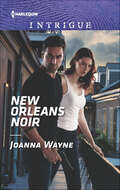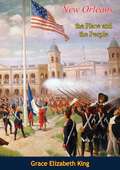- Table View
- List View
New Directions in Strategic Thinking (Routledge Library Editions: Cold War Security Studies #32)
by Robert O’neill; D.M. HornerThis book, first published in 1981, examines the broader aspects of international strategic relations, and analyses Cold War developments within particular nations, fields of warfare and areas of political-military interaction. The role of force in international society changed as the nuclear deadlock between the superpowers continued, with military forces being deployed for political purposes in situations only just short of war. The balance between NATO and Warsaw Pact forces also changed as American technology increased and short-range nuclear missiles were deployed in Europe. This book also examines the development of strategic thinking in China, Japan and India, as well as insurgency in the Third World, so often the site for proxy superpower conflict.
New Directions in Water Resources Planning for the U.S. Army Corps of Engineers
by National Research CouncilThe U.S. Army Corps of Engineers has long been one of the federal government's key agencies in planning the uses of the nation's waterways and water resources. Though responsible for a range of water-related programs, the Corps's two traditional programs have been flood damage reduction and navigation enhancement. The water resource needs of the nation, however, have for decades been shifting away from engineered control of watersheds toward restoration of ecosystem services and natural hydrologic variability. In response to these shifting needs, legislation was enacted in 1990 which initiated the Corps's involvement in ecological restoration, which is now on par with the Corps's traditional flood damage reduction and navigation roles.This book provides an analysis of the Corps's efforts in ecological restoration, and provides broader recommendations on how the corps might streamline their planning process. It also assesses the impacts of federal legislation on the Corps planning and projects, and provides recommendations on how relevant federal policies might be altered in order to improve Corps planning. Another important shift affecting the Corps has been federal cost-sharing arrangements (enacted in 1986), mandating greater financial participation in Corps water projects by local co-sponsors. The book describes how this has affected the Corps-sponsor relationship, and comments upon how each group must adjust to new planning and political realities.
New England Citizen Soldiers of the Revolutionary War: Minutemen & Mariners (Military Ser.)
by Robert A GeakeA historian goes beyond the famous faces to tell the stories of ordinary citizens who served as militiamen and mariners during the American Revolution. Americans know Paul Revere and General George Washington—but lesser known are those unsung heroes or citizen soldiers who first enlisted with local militias before being assigned to units of the Continental Line and sent away to fight in states and regions far removed from their homes and families. In New England, these also included men of the sea who signed aboard privateers or became part of the Mariner brigades that became indispensable in navigating waterways and ferrying troops into position. New England Citizen Soldiers is also the larger story of their struggle to maintain their loyalty and their ties to their home states, property, and family. Historian Robert Geake uncovers the untold story of ordinary citizens who became united in the cause for freedom.
New England Coast Guard Stories: Remarkable Mariners (American Heritage)
by Dyke HendricksonIn 1790, Treasury Secretary Alexander Hamilton asked President George Washington to fund a fleet of "revenue cutters" that could halt smuggling and collect taxes in U.S. waters. Today, from northern Maine to southern Connecticut, the Coast Guard provides the might and the oversight to ensure that the coastlines are safe and navigable. From icebreaking and harrowing rescues to the global war on terror, the service plays a unique role in the region. Author Dyke Hendrickson profiles the varied careers and contributions of the brave men and women throughout New England who ensure the service remains Semper Paratus-Always Ready.
New Face in the Mirror: A Novel
by Yaël DayanInspired by the author's own experience, a novel of one female soldier's fight to maintain her independence while serving in the Israeli army Ariel Ron is the spoiled yet fiercely proud daughter of a renowned Israeli colonel, entering the army for her two-year period of compulsory military service. Rebellious and self-centered, she is determined to keep her independence within this highly structured system. Ariel expects that being the colonel's daughter will win her favors in the army--but she is sorely mistaken. As she comes to terms with this reality, she embarks on a journey that forces her to look inward and reflect on her own values and connection to her homeland. Based on Yaël Dayan's own experience in the Israeli army and partly written when she was not yet twenty, this searing and honest first novel is a rare look at a young woman struggling to find her true self in a strange and uncomfortable environment.
New Frontier: Double-time (Cold Equations #No. 9)
by Peter DavidThe ancient Thallonian Empire has collapsed, throwing an entire sector of the galaxy into chaos and unrest. Billions of sentient beings are faced with starvation, warfare, and worse. Faced with a tragedy of interstellar proportions, Starfleet assembles a new, handpicked crew to help where it can and report what it finds. Captain Mackenzie Calhoun, recommended by Jean-Luc Picard himself, takes command of the U.S.S. Excalibur, which is manned by Starfleet's best and brightest, including some old friends from Star TreK: The Next Generation and some of the most dynamic new characters ever to boldly go where no one has gone before! This special hardcover edition contains the first thrilling adventure that launched Star Trek into a new frontier. It also contains a pull-out full-color print of all of the characters and a special "minipedia" guide to the people, places, and things that make up the New Frontier universe!
New Georgia: The Second Battle for the Solomons (Twentieth-Century Battles)
by Ronnie Day&“A detailed, up-to-date, integrated air-land-sea history&” of a pivotal WWII campaign in the Pacific from both American and Japanese perspectives (Vincent P. O'Hara, author of In Passage Perilous). In 1942, the Solomon Islands formed the stepping stones toward Rabaul, the main base of Japanese operations in the South Pacific, and the Allies&’ primary objective. The stunning defeat of Japanese forces at the Naval Battle of Guadalcanal in November marked the turning point in the war against Japan and the start of an offensive in the Central Solomons aimed at New Georgia. New Georgia: The Second Battle for the Solomons tells the story of the land, sea, and air battles fought there from March through October 1943. Making careful and copious use of both Japanese and Allied sources, Ronnie Day masterfully weaves the intricate threads of these battles into a well-crafted narrative of this pivotal period in the war. As Day makes clear, combat in the Solomons exemplified the war in the Pacific, especially the importance of air power, something the Japanese failed to understand until it was too late, and the strategy of island hopping, bypassing Japanese strongholds (including Rabaul) in favor of weaker or more strategically advantageous targets. This multifaceted account gives the fighting for New Georgia its proper place in the history of the drive to break the Japanese defensive perimeter and bring the homeland within range of Allied bombers.
New Guinea (Stackpole Military Photo Series)
by Jon DiamondVisual history of the Allied battles for New Guinea during 1942-44.
New Guinea 1942-44 (Routledge Library Editions: World War II in Asia)
by Timothy HallDrawing on material that had only just been released when this book was originally published in 1981, this book provides a graphic account of the war which, to all intents and purposes, was fought on Australian soil against Australian people – a war which came to the very door of Australia itself. When the Japanese landed at Rabaul on 23 January 1942 it was the start of one of the fiercest campaigns of the war. On that day, with only a handful of badly trained troops, led by inexperienced officers, Australia faced its most serious threat yet. It was to be a campaign with all the ingredients of great drama – cowardice and extraordinary courage, untrained men becoming brave, skilful fighters, torture and unimaginable brutality. On the infamous Kokoda trail, men died in their hundreds, as the Japanese advanced on Port Moresby. And when the Japanese retreated, the advancing Australian troops learnt just how brutal the fighting had been.
New Hampshire and the Civil War: Voices from the Granite State (Civil War Series)
by Bruce D. Heald PhDThe Granite State has a remarkable record of service during the Civil War. It supplied a total of 10,657 recruits for the infantry, cavalry and field artillery divisions in 1861, with the majority of these first recruits enlisting for three years of service. Historian Bruce Heald lets the soldiers and sailors tell their stories in their own words by weaving together the letters to those left behind--families in Portsmouth and Nashua and sweethearts in Concord and Manchester. Heald includes brief introductions to each volunteer regiment, accounts of more than one hundred personal letters and an in-depth look at camp life. This book offers a personal and intimate connection with New Hampshire during the War Between the States through the voices of its heroic sons.
New Hampshire in the Civil War (Civil War Series)
by Bruce D. HealdIn the course of history, few human events have had so compelling an effect and left such a deep mark on the nation's soul as has the Civil War. New Hampshire in the Civil War presents a unique and concise pictorial chronicle of the state's volunteer regiments that served during the four very long and costly war years.This volume includes more than 200 vivid and accurate pictures depicting heroic battles scenes, maps, camp life, and more than 40 portraits of the men who served New Hampshire in battle. These chapters contain accounts of battles from the first bombardment of Fort Sumter to the sinking of the Alabama. Also included are glimpses of camp life, with its frying pan meals of "slosh" and the illnesses accompanied by "cold clammy sweat," and of the famous Libby Prison.
New Haven in World War I (Military)
by Laura A. MacalusoDuring World War I, New Haven was a hive of wartime activity. The city hummed with munition production from the Winchester Repeating Arms Company, while food conservation campaigns, canning kitchens and book drives contributed to the war effort. Meanwhile, Walter Camp, father of American football, whipped recruits and city residents into shape with his fitness programs. The Knights of Columbus were also busy preparing their "Everyone Welcome! Everything Free!" huts. And one hero--a brown-and-white dog, Sergeant Stubby--first made his appearance at Camp Yale, home of the 102nd Regiment of the Yankee Division. Using library and museum collections, author Laura A. Macaluso demonstrates how the Elm City contributed its time and money, men and women and one special dog to the first global war of the twentieth century.
New Histories of Art in the Global Postwar Era: Multiple Modernisms (ISSN)
by Flavia FrigeriThis book maps key moments in the history of postwar art from a global perspective. The reader is introduced to a new globally oriented approach to art, artists, museums and movements of the postwar era (1945–70). Specifically, this book bridges the gap between historical artistic centers, such as Paris and New York, and peripheral loci. Through case studies, previously unknown networks, circulations, divides and controversies are brought to light. From the development of Ethiopian modernism, to the showcase of Brazilian modernity, this book provides readers with a new set of coordinates and a reassessment of well-trodden art historical narratives around modernism. This book will be of interest to scholars in art historiography, art history, exhibition and curatorial studies, modern art and globalization.
New Histories of Art in the Global Postwar Era: Multiple Modernisms (Studies in Art Historiography)
by Flavia FrigeriThis book maps key moments in the history of postwar art from a global perspective. The reader is introduced to a new globally oriented approach to art, artists, museums and movements of the postwar era (1945–70). Specifically, this book bridges the gap between historical artistic centers, such as Paris and New York, and peripheral loci. Through case studies, previously unknown networks, circulations, divides and controversies are brought to light. From the development of Ethiopian modernism, to the showcase of Brazilian modernity, this book provides readers with a new set of coordinates and a reassessment of well-trodden art historical narratives around modernism. This book will be of interest to scholars in art historiography, art history, exhibition and curatorial studies, modern art and globalization.
New History of the Peloponnesian War
by Donald KaganA New History of the Peloponnesian War is an ebook-only omnibus edition that includes all four volumes of Donald Kagan's acclaimed account of the war between Athens and Sparta (431–404 B.C.): The Outbreak of the Peloponnesian War, The Archidamian War, The Peace of Nicias and the Sicilian Expedition, and The Fall of the Athenian Empire. Reviewing the four-volume set in The New Yorker, George Steiner wrote, "The temptation to acclaim Kagan's four volumes as the foremost work of history produced in North America in the twentieth century is vivid. . . . Here is an achievement that not only honors the criteria of dispassion and of unstinting scruple which mark the best of modern historicism but honors its readers." All four volumes are also sold separately as both print books and ebooks.
New Jersey and the Medal of Honor: A History (Military)
by Peter ZablockiAwarded by the President of the United States in the name of Congress, the Medal of Honor commemorates those who have shaped our nation's history and continue to inspire its future with their acts of valor, humanity, patriotism, and sacrifice. New Jersey has been credited with ninety-three honors in the state's military history. Robert Augustus Sweeney was the recipient of two non-combatant medals when he jumped into stormy waters to save a fellow sailor twice becoming one of only nineteen double Medal of Honor recipients of all time and the only African American to do so. On the infamous day of December 7, 1941, Peter Tomich, serving on the USS Utah, sprung to action when it became evident his ship would capsize from the two Japanese torpedoes, staying behind to man the fireroom to ensure the boilers were secured to prevent an internal fire and saving countless additional deaths.Author Peter Zablocki reveals the harrowing stories of New Jersey's most valorous moments in the defense of our nation and freedom around the world.
New Kingdom Egypt
by Mark Healy Angus McbrideOsprey's examination of the New Kingdom of Egypt (16th - 11th Century BC) and it's people. Builders of the Pyramids and most ancient of all the powers of the biblical world, the Egyptians remain one of history's most fascinating and enigmatic peoples. During the New Kingdom era, Egypt reached the peak of its power, wealth, and territory. Through the intensive military campaigns of Pharaoh Thutmose III (1490-1436BC), Palestine, Syria, and the northern Euphrates area in Mesopotamia were all brought within the New Kingdom. Mark Healy outlines the history, organisation and dress of the New Kingdom Egyptians in this volume packed with accompanying illustrations and photographs, including 12 full page colour plates by the ever popular Angus McBride.
New Men: Reconstructing the Image of the Veteran in Late-Nineteenth-Century American Literature and Culture (Reconstructing America)
by John A. Casey Jr.Scholars of the Civil War era have commonly assumed that veterans of the Union and Confederate armies effortlessly melted back into society and that they adjusted to the demands of peacetime with little or no difficulty. Yet the path these soldiers followed on the road to reintegration was far more tangled. New Men unravels the narrative of veteran reentry into civilian life and exposes the growing gap between how former soldiers saw themselves and the representations of them created by late-nineteenth century American society. In the early years following the Civil War, the concept of the “veteran” functioned as a marker for what was assumed by soldiers and civilians alike to be a temporary social status that ended definitively with army demobilization and the successful attainment of civilian employment. But in later postwar years this term was reconceptualized as a new identity that is still influential today. It came to be understood that former soldiers had crossed a threshold through their experience in the war, and they would never be the same: They had become new men. Uncovering the tension between veterans and civilians in the postwar era adds a new dimension to our understanding of the legacy of the Civil War. Reconstruction involved more than simply the road to reunion and its attendant conflicts over race relations in the United States. It also pointed toward the frustrating search for a proper metaphor to explain what soldiers had endured.A provocative engagement with literary history and historiography, New Men challenges the notion of the Civil War as “unwritten” and alters our conception of the classics of Civil War literature. Organized chronologically and thematically, New Men coherently blends an analysis of a wide variety of fictional and nonfictional narratives. Writings are discussed in revelatory pairings that illustrate various aspects of veteran reintegration, with a chapter dedicated to literature describing the reintegration experiences of African Americans in the Union Army. New Men is at once essential reading for anyone who wants to understand the origins of our concept of the “veteran” and a book for our times. It is an invitation to build on the rich lessons of the Civil War veterans’ experiences, to develop scholarship in the area of veterans studies, and to realize the dream of full social integration for soldiers returning home.
New Mexico in the Mexican-American War (Military)
by Ray John AragónEstablishing New Mexico as a U.S. territory was anything but bloodless. The Mexican-American War brought ferocious battles, brutal sieges, guerrilla warfare and scorched earth tactics. More than three hundred Mexican and American forces were killed or wounded in a single battle near Santa Fe. During the Taos Revolt, Governor Charles Bent was scalped and murdered in his home, and American forces fired cannons into a church where Pueblos and Mexicans sought refuge. Soldiers destroyed entire villages like Los Valles, killing or forcing residents to flee. Author Ray John de Aragón recounts these and other dramatic stories behind the birth of the Land of Enchantment.
New Mexico's Struggle For Statehood: Sixty Years of Effort to Obtain Self Government
by L. Bradford PrinceDelve into the captivating history of New Mexico's prolonged and arduous journey to statehood with L. Bradford Prince's meticulously detailed book, "New Mexico's Struggle For Statehood: Sixty Years of Effort to Obtain Self Government." This comprehensive work explores the political, social, and cultural challenges faced by New Mexico as it endeavored to join the Union from the mid-19th century to the early 20th century.Prince, a prominent figure in New Mexico’s history and a key advocate for its statehood, provides an insider’s perspective on the relentless efforts and numerous obstacles encountered over six decades. Through thorough research and engaging narrative, he chronicles the pivotal moments, key players, and significant events that shaped New Mexico’s quest for self-governance.The book offers a vivid portrayal of the diverse and often contentious interactions between Native American tribes, Hispanic settlers, and Americans, highlighting the unique cultural mosaic that defined the territory. Prince examines the impact of national politics, economic challenges, and local governance issues that delayed New Mexico’s acceptance as a state.Readers will gain insight into the strategic campaigns, legislative battles, and public sentiment that ultimately led to New Mexico's admission to the Union in 1912. Prince’s narrative captures the determination and resilience of New Mexico’s leaders and citizens who fought tirelessly for recognition and self-determination."New Mexico's Struggle For Statehood" is an essential read for history enthusiasts, scholars of American politics, and anyone interested in the rich and complex history of the American Southwest. L. Bradford Prince's authoritative account ensures that the story of New Mexico's fight for statehood is preserved and appreciated, shedding light on an important chapter in the broader narrative of the United States' expansion and development.
New Model Army
by Adam RobertsAdam Roberts' new novel is a terrifying vision of a near future war - a civil war that tears the UK apart as new technologies allow the world's first truly democratic army to take on the British army and wrest control from the powers that be.Taking advances in modern communication and the new eagerness for power from the bottom upwards, Adam Roberts has produced a novel that is at once an exciting war novel and a philosophical examination of war and democracy.It shows one of the UK's most exciting and innovative literary voices working at the height of his powers and investing SF with literary significance that is its due.
New Orleans As It Was: Episodes of Louisiana Life [Illustrated Edition]
by Henry C. CastellanosA criminal lawyer and popular journalist, Henry C. Castellanos lived nearly three-quarters of the nineteenth century in New Orleans. In his later years, between 1892 and 1895, he wrote more than 120 articles for the Times-Democrat on the history and mores of his beloved city, and in 1895 he published a selection of those episodes in New Orleans as It Was. This facsimile reproduction of the volume includes a new introduction by historian Judith Kelleher Schafer, which pieces together the little-known life of Castellanos and provides insights about a period when New Orleans was the queen city of the South. Castellanos's collection of vignettes, incidents, anecdotes, personalities, and descriptions focuses on the years 1820 to 1860 and reflects the interests of a city newspaperman. The reader encounters duels, voodoos, executions, and piracy, and meets mayors, generals, slaves, masters, princes, paupers, judges, prisoners, and jailers. Castellanos describes in detail buildings, public parks, suburbs, notable houses, churches, and neighboring plantations as well as the characteristics, customs, dress, food, and amusements of New Orleanians. In capturing what he called New Orleans's "unwritten history," Castellanos brings alive for readers today America's most interesting city at a younger age.-Print ed.
New Orleans Class Cruisers (ShipCraft #No. 13)
by Lester AbbeyThe ShipCraft series provides in-depth information about building and modifying model kits of famous warship types. Lavishly illustrated, each book takes the modeller through a brief history of the subject class, highlighting differences between sister-ships and changes in their appearance over their careers. This includes paint schemes and camouflage, featuring colour profiles and highly detailed line drawings and scale plans. The modelling section reviews the strengths and weaknesses of available kits, lists commercial accessory sets for super-detailing of the ships, and provides hints on modifying and improving the basic kit. This is followed by an extensive photographic survey of selected high-quality models in a variety of scales, and the book concludes with a section on research references - books, monographs, large-scale plans and relevant websites.The subject of this volume is the seven-ship New Orleans class, probably the US Navys most hard-fought heavy cruisers of the War three were sunk in action but others survived massive damage, and by 1945 three out of four of the navys most decorated ships were of this class. Although designed within treaty limitations, they proved powerful and well-balanced ships, and their unparalleled fighting record makes them popular modelling subjects.
New Orleans Noir
by Joanna WayneThe French Kiss Killer has returnedand has his next target in sight…Detective Hunter Bergeron has two goals: find the French Kiss Killer and keep Helena Cosworth from becoming his next victim. Hunter and Helena share a past, and close proximity now only reignites their attraction. But with New Orleans on high alert, giving in to old feelings is a distraction neither can afford. Especially in the darkest corners of the Quarter.
New Orleans the Place and the People
by Grace Elizabeth KingThe work presented here is a popular history of New Orleans published in 1895 and covering the entire history of the city down to that date. It is written in a vivid, discursive style.Not as well-known as some of her contemporaries—Mark Twain, George W. Cable, and Joel Chandler Harris, to name a few—author and historian Grace King (1851- 1932) was nonetheless highly praised in her own right. She garnered attention from such eminent critics as William Dean Howells, and her work frequently appeared in Harper's and Century Magazine. She published thirteen volumes of fiction, history, biography, and memoir. What contributed to King's critical acclaim, and her continued importance across time, was the panoramic view of social and historical New Orleans that she captured in her writing. She was, scholar Robert Bush argues, one of the most talented and perceptive citizens of New Orleans during the post- Civil War period. In pursuing an intellectual career, King broke with many Old South traditions. She embraced Anglo-Saxon and Creole French cultures. Much of her work is especially interesting for the way in which her view of the southern temper and cultural contribution supplemented that of other writers of the period.-Print ed.
